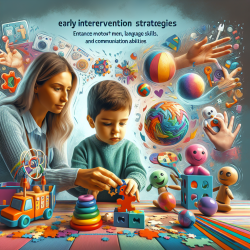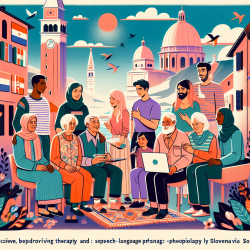Recent research, such as the study by McCleery et al. (2013), highlights the significance of motor development and motor resonance difficulties in children with autism. These motor-related deficiencies are linked to delays in social-communicative and language development. Understanding these links can help practitioners design effective early interventions. Here, we discuss the key findings and their implications for practice.
Key Findings from the Research
- Children with autism often experience delays and impairments in motor skills, including fine and gross motor coordination, postural control, and imitation.
- Deficits in motor resonance, or the ability to mirror others' actions, are prevalent in children with autism and can hinder social engagement and communication.
- Motor development milestones, such as coordinated vocal and facial motor activities, are crucial for later language and social-emotional development.
Implications for Early Intervention
Understanding the role of motor development in autism can inform early intervention strategies. Here are some evidence-based approaches:
1. Augmentative and Alternative Communication (AAC) Interventions
Picture Exchange Communication System (PECS): Unlike Sign Language Training (SLT), PECS has shown more consistent success in teaching communication skills to children with autism. PECS utilizes pictures to facilitate spontaneous communication and has been linked to improvements in both social-communication and speech.
2. Motor-Based Behavioral Interventions
Prompts for Restructuring Oral Muscular Phonetic Targets (PROMPT): This method involves direct manipulation of the child's speech mechanisms to improve speech clarity. Although research is limited, preliminary findings suggest PROMPT may be effective for children with autism.
3. Electromagnetic Brain Stimulation Interventions
Transcranial Direct Current Stimulation (tDCS) and Transcranial Magnetic Stimulation (TMS): These non-invasive brain stimulation techniques have shown promise in preliminary studies but require further research to establish their efficacy and safety for children with autism.
4. Interventions Targeting Synchronous Motor Activities
Early Start Denver Model (ESDM): This integrative approach combines developmental and behavioral techniques to enhance social engagement and communication skills. Research has shown significant improvements in adaptive behavior and language skills.
Reciprocal Imitation Training (RIT): RIT focuses on improving imitation skills, which are foundational for social learning and communication. Studies have demonstrated gains in imitation, language, and social skills.
Encouraging Further Research
While these interventions show promise, more experimental research is needed to validate their efficacy. Practitioners are encouraged to stay informed about emerging research and consider integrating motor-related approaches into their practice to support the development of communication skills in children with autism.
To read the original research paper, please follow this link: Motor development and motor resonance difficulties in autism: relevance to early intervention for language and communication skills.










